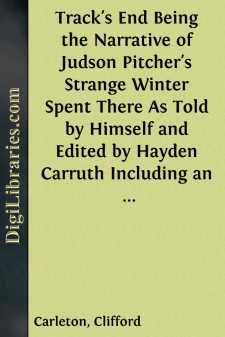Categories
- Antiques & Collectibles 13
- Architecture 36
- Art 48
- Bibles 22
- Biography & Autobiography 813
- Body, Mind & Spirit 142
- Business & Economics 28
- Children's Books 15
- Children's Fiction 12
- Computers 4
- Cooking 94
- Crafts & Hobbies 4
- Drama 346
- Education 46
- Family & Relationships 57
- Fiction 11828
- Games 19
- Gardening 17
- Health & Fitness 34
- History 1377
- House & Home 1
- Humor 147
- Juvenile Fiction 1873
- Juvenile Nonfiction 202
- Language Arts & Disciplines 88
- Law 16
- Literary Collections 686
- Literary Criticism 179
- Mathematics 13
- Medical 41
- Music 40
- Nature 179
- Non-Classifiable 1768
- Performing Arts 7
- Periodicals 1453
- Philosophy 64
- Photography 2
- Poetry 896
- Political Science 203
- Psychology 42
- Reference 154
- Religion 513
- Science 126
- Self-Help 84
- Social Science 81
- Sports & Recreation 34
- Study Aids 3
- Technology & Engineering 59
- Transportation 23
- Travel 463
- True Crime 29
Track's End Being the Narrative of Judson Pitcher's Strange Winter Spent There As Told by Himself and Edited by Hayden Carruth Including an Accurate Account of His Numerous Adventures, and the Facts Concerning His Several Surprising Escapes...
Description:
Excerpt
CHAPTER I
Something about my Home and Track’s End: with how I leave the one and get acquainted with Pike at the other.
When I left home to shift for myself I was eighteen years old, and, I suppose, no weakling; though it seems to me now that I was a mere boy. I liked school well enough, but rather preferred horses; and a pen seems to me a small thing for a grown man, which I am now, to be fooling around with, but I mean to tell (with a little help) of some experiences I had the first winter after I struck out for myself.
I was brought up in Ohio, where my father was a country blacksmith and had a small farm. His name was William Pitcher, but, being well liked by all and a square man, everybody called him Old Bill Pitcher. I was named Judson, which had been my mother’s name before she was married, so I was called Jud Pitcher; and when I was ten years old I knew every horse for a dozen miles around, and most of the dogs.
It was September 16th, in the late eighteen-seventies, that I first clapped eyes on Track’s End, in the Territory of Dakota. The name of the place has since been changed. I remember the date well, for on that day the great Sisseton prairie fire burned up the town of Lone Tree. I saw the smoke as our train lay at Siding No. 13 while the conductor and the other railroad men nailed down snake’s-heads on the track. One had come up through the floor of the caboose and smashed the stove and half killed a passenger. Poor man, he had a game leg as long as I knew him, which was only natural, since when the rail burst through the floor it struck him fair.
I was traveling free, as the friend of one of the brakemen whom I had got to know in St. Paul. He was a queer fellow, named Burrdock. The railroad company set great store by Burrdock on account of his dealings with some Sioux Indians. They had tried to ride on top of the cars of his train without paying fare, and he had thrown them all off, one by one, while the train was going. The fireman told me about it.
Burrdock was taking me out to Track’s End because he said it was a live town, and a good place for a boy to grow up in. He had first wanted me to join him in braking on the railroad, but I judged the work too hard for me. If I had known what I was coming to at Track’s End I’d have stuck to the road.
Perhaps I ought to say that I left home in June, not because I wasn’t welcome to stay, but because I thought it was time I saw something of the world. Mother was sure I should be killed on the cars, but at last she gave her consent. I went to Galena, from there up the Mississippi on a packet to St. Paul, and then out to Dakota with Burrdock.
The snake’s-heads delayed us so that it was eleven o’clock at night before we reached Track’s End. Ours was the only train that ran on the road then, and it came up Mondays and Thursdays, and went back Tuesdays and Fridays. It was a freight-train, with a caboose on the end for passengers, “and the snake’s-heads,” as the fireman said. A snake’s-head on the old railroads was where a rail got loose from the fish-plate at one end and came up over the wheel instead of staying down under it....


